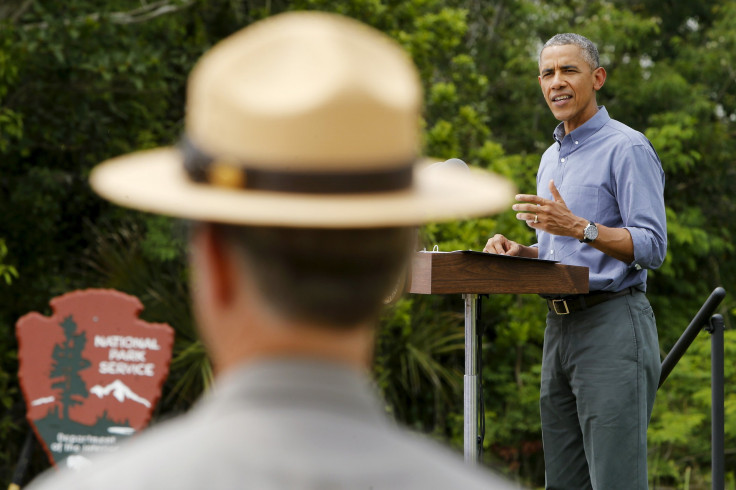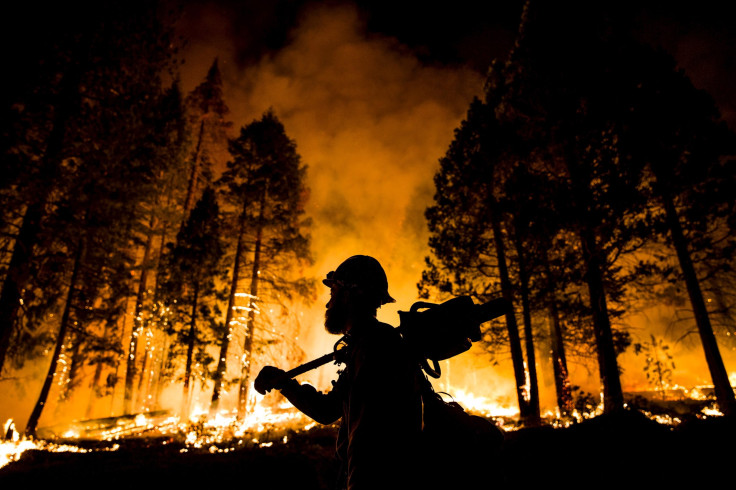Obama Climate Change Legacy: Alaska Visit Sets Up International Greenhouse Gas Emissions Conference In Paris

In a video released earlier this month, images of melting glaciers, burning wildfires and parched earth accompanied the voice of U.S. President Barack Obama, who explained with a sense of urgency that he was planning a trip to the Alaskan wilderness in part because "Alaskans are on the front lines of the greatest challenge we face this century." On Monday, the president was expected to follow through on those plans during the last stop of a multi-day trip that he has been using to call attention to the mounting risks of climate change.
Obama's trip to Alaska, which underscores his long-stated dedication to tackling climate change head-on, comes months before a major international meeting on climate change in Paris this December. If his administration is able to broker a substantial deal with more than 200 nations at the conference to reduce global greenhouse gas emissions -- a deal which has thus far proven elusive -- it would further solidify a legacy already firmly built on fighting global warming.
"As I'll talk about next week, when I visit Alaska, making our communities more resilient is going to be increasingly important, because we're going to see more extreme weather events as the result of climate change -- deeper droughts, deadlier wildfires, stronger storms," Obama said last week in New Orleans while commemorating the 10th anniversary of Hurricane Katrina.
Paris could very well be the last real chance that the president has to reach an international agreement to curb emissions. The summit comes six years after a similar conference in Copenhagen, Denmark, when the international community agreed for the first time that greenhouse gas emissions needed to be reduced. Those negotiations ultimately broke down, and no country was officially mandated to implement any emission reduction standards.
"It's absolutely a legacy issue for the president. I think he sees it that way. There's no doubt that the White House staff sees it this way," said John Coeqyut, the director of federal and international climate campaigns with the Sierra Club, an environmental advocacy organization.
The issue is personal for the president. Looking ahead, he's mentioned frequently that if emissions and global warming aren't addressed, then the world inherited by future generations will be at the mercy of the world's changing climate. "This is the only planet we’ve got," he said in April. "And years from now, I want to be able to look our children and grandchildren in the eye and tell them that we did everything we could to protect it.
After years of turning up the intensity around climate change issues, the Obama administration seems to have found steady footing going into the December negotiations. Things weren't, however, always so promising.
In his first year in office, the president had the chance to negotiate an international accord in Copenhagen. That year, the United States came to the negotiating table hoping that the world could update existing greenhouse gas reducing targets as detailed in the 1997 Kyoto Protocol, which the U.S. had refused to ratify under President George W. Bush. There was a lot of optimism for Copenhagen, as one of the world's largest powers had just changed leadership to have a man who was sympathetic to global warming issues in power.
The final agreement to come out of Copenhagen, called the Copenhagen Accord, gave leeway to countries to form their own proposals for reductions, leaving open the question of who aside from the U.S. was going to pay for reductions in poorer countries. The decision to allow countries to form their own proposals also meant that certain countries, such as China or India, would have to make painful cuts to their energy programs that depend on fuels like coal, which release a lot of carbon into the atmosphere when burned.
"I think it's exceedingly important [that the United States take a leadership position]. The U.S. is more responsible for the situation than any other country," said Kevin Trenberth, a distinguished senior scientist at the National Center for Atmospheric Research in Boulder, Colorado. "I think the U.S. has an ethical and moral responsibility to lead. We can't solve the problems by ourselves... [but] there's no other country in the world that can provide that leadership."
Obama pushed hard early in his presidency for a cap-and-trade bill to be passed, which would have created an incentive for companies to cut back their carbon emissions while raising costs for companies that didn't reduce emissions. The bill was passed in the House of Representatives before being shot down in the Senate in July of 2010. The Tea Party, a far-right constituency, came into force soon thereafter, at least partially fueled by their opposition to the president's climate plans. They succeeded in putting a significant number of lawmakers into Congress in the 2010 midterm, effectively cutting off the president's prospects for significant legislation in many of the policy areas he wanted to tackle, including climate change. That Congressional opposition has followed his presidency like a shadow since, and he dropped the issue heading into re-election.

Since winning re-election in 2012, Obama's administration has unveiled a series of emissions guidelines and pushed for renewable energy technology expansion in the country. He has set up billions of dollars in federal loan guarantees for renewable energy projects like solar and wind that do not contribute to greenhouse gas levels. The White House touts that those loans have increased solar generation more than tenfold and have tripled wind energy generation.
Through executive action, he's increased fuel economy standards for cars and trucks in the country, major sources of greenhouse gas carbon dioxide. In August, he unveiled his Clean Power Plan (and was choked up with emotion while announcing it), which is expected to cut carbon dioxide emissions by 32 percent of 2005 levels by 2030. That plan is basically cap-and-trade but implemented by the Environmental Protection Agency, a controversial method that upset Republicans in Congress who would prefer that those changes be made by the legislature.
The Clean Power Plan, like many of Obama's executive actions, was met with lawsuits. In spite of the legal challenges, it is still likely to be implemented, even in states such as West Virginia, which rely heavily on coal for their economies.
The administration has also been active in working to secure support for climate change action from other large countries that will have considerable clout in Paris. In November, the United States and China reached a historic agreement in which the U.S. committed to emissions cuts of 26 to 28 percent from 2005 emission levels, which the Clean Power Plan exceeds, and China agreed to have their emissions peak by 2030, if not earlier. An agreement with Brazil was reached in June in which the South American country pledged to eliminate illegal deforestation while increasing their reliance on renewable energy sources to 28 to 33 percent of their supply by 2030.
The agreement between China and the U.S., "set the tone for everything over the past year, and a number of countries have since made their pledges both formally and informally," Coeqyut said. "This is the big meeting post-Copenhagen, and there's been a huge amount of learning."
Congress could still shoot down some pressing, unresolved issues, such as financing for the greenhouse gas reduction for poorer countries -- a major stumbling block for negotiators going into Paris since most major nations like China, the U.S. and Brazil have all negotiated their pledges for the conference.
Paris won't be the end of the road, and Obama knows that. But he also wants to make sure that the world will still be around for future generations, and he clearly thinks climate changes is a threat to that.
"What’s happening in Alaska isn’t just a preview of what will happen to the rest of us if we don't take action," Obama said in the video. "It’s our wakeup call. The alarm bells are ringing, and as long as I’m president, America will lead the world to meet this threat before it’s too late."
Follow me on Twitter: @ClarkMindock
© Copyright IBTimes 2025. All rights reserved.






















